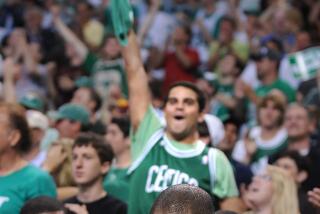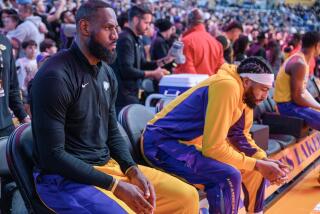If at first they succeed, Phil Jackson’s Lakers are perfect
Best of one?
Welcome to an NBA Finals that, despite being blessed with rivalry of 51 years, could be decided in the first 48 minutes.
Welcome to a series where the Lakers aren’t playing the Boston Celtics as much as both of them could soon be tangling with the one of the most majestic, maddening statistics in sports
It’s all about a number. A number so trivial that half the players in the series are unaware of it, yet so powerful it could end the series almost before it starts. A number with as much lore as Kobe Bryant’s 24, as alive as Kevin Garnett’s 5, even more important than the number of the paramedics that Paul Pierce will phone the first time he is gently pushed to the wood.
You’ve probably heard the number. You’ve probably thought you heard it wrong. You haven’t.
When Phil Jackson’s teams have won the first game of a postseason series, they are 47-0 in that series.
Think about that.
When Jackson’s teams win Game 1, it’s Series Done. If they win the first one, they will win the last one. Nineteen seasons. Every single time.
Theoretically, the Game 1 winner in any sport has a 65% chance of winning a seven-game series. Historically, the NBA’s Game 1 winners ultimately triumph 79% of the time.
Jackson’s teams do it 100% of the time, including 23 consecutive times with the Lakers.
“Staggering,” said Kobe Bryant
“Mind-boggling,” said Luke Walton.
“Huh?” said Rasheed Wallace.
The Celtics forward, among others, apparently has never heard the number. Judging from the way he stared vacantly at the media during Wednesday’s interview day, one might think he couldn’t even remember the number on his back, but I threw this one at him nonetheless.
“That’s just media stuff,” he said. “That don’t mean nothing to me.”
That’s what all Lakers opponents say. Over the last several years, as the number as grown from an oddity to a coincidence to a real trend, the other guys insist they know nothing about it. Then the Lakers win the first game, and they can’t forget it.
“I’m sure with some players, when they lose that first game, it’s like, “Oh my gosh, do you see that number?”’ said Will Perdue, former Jackson disciple and current radio guy. “The players are telling each other, ‘They never lose after they win the first game of a series? If we don’t win the next game, we’re done.’ ”
The Celtics are not those players. Or are they? Surrounded with history, the Celtics are smart enough to understand the difficulty in defeating it.
Are you telling me that if the Lakers win in the opener Thursday night at Staples Center, the Celtics aren’t going to be peppered with that number for the next two weeks? And that at least some of it isn’t going to stick?
“I know when I go to the free-throw line, the odds of me missing one grow if I haven’t missed one in a while,” Boston’s Ray Allen said with a grin. “So I’ll think of it like that.”
The Celtics act like the number is a coincidence. Smarter people than both of us say it is not. I thought about Boston, and thought about MIT, and decided that, yes, I should consult with someone from the brainiest university in the country.
So I called the folks from Caltech.
A couple of grad students in applied and computational mathematics —Stephen Becker and Mike McCoy — figured that the odds of going 47-0 by coincidence were less than three in a billion.
“I would be demoralized if I were the other team,” Becker said.
Gary Lorden, a Caltech professor emeritus in mathematics, added, “If I were a huge basketball fan and ran into this stat, I would say, wow.”
So we know that it means something. But what does it mean?
It means, obviously, that Jackson usually has a team with more talent and home-court advantage. But it also means that he gives his teams the poise and preparation to get better as a series progresses. It’s what he does better than anyone. In fact, only once has a Jackson team lost a series in which it led at any point.
Think of this spring. Jackson put out the fire in Ron Artest’s twitters, calmed the shock in Kobe Bryant’s photos, handled the tear in Andrew Bynum’s knee, and stuck with Derek Fisher long enough for Fisher to stick it to the Phoenix Suns.
If Jackson’s teams are good enough to win the first game, they are prepared enough to win the series, period. And if they are not, well, they are 7-8 when they lose that first game.
“It’s pretty obvious the first game to win is a very important element in any kind of series,” Jackson said. “It also shows a little bit of dominance and preparedness.”
History says it will show more than that. Some of us fools have picked the Lakers in seven. History will be betting on the Lakers in one.
twitter.com/billplaschke
More to Read
All things Lakers, all the time.
Get all the Lakers news you need in Dan Woike's weekly newsletter.
You may occasionally receive promotional content from the Los Angeles Times.







